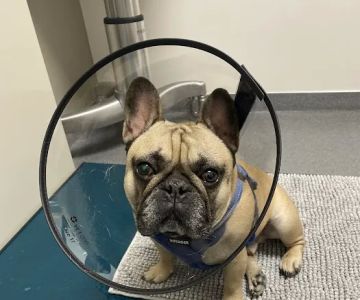How to Apply to Veterinary School: A Comprehensive Guide
Becoming a veterinarian is a dream for many, but the path to veterinary school can feel daunting. If you’ve always had a passion for animals and science, pursuing a veterinary career can be an incredibly rewarding experience. However, applying to veterinary school is competitive, and it’s essential to understand the process fully before taking the plunge. In this guide, I’ll walk you through everything you need to know about applying to veterinary school, from the academic prerequisites to the application itself and beyond.

5910 S University Blvd B4, Greenwood Village, CO 80121, USA
See Details1. Understanding the Veterinary School Requirements
Before even thinking about applying to veterinary school, it's crucial to understand the basic requirements. Veterinary schools typically require applicants to have completed a bachelor’s degree with specific courses, including biology, chemistry, physics, and mathematics. Some schools might even require additional coursework in animal science or related fields. Keep in mind that every veterinary school has its own set of requirements, so it’s vital to research the schools you're interested in to ensure you meet their criteria.
In addition to academic prerequisites, veterinary schools often look for applicants who have hands-on experience with animals. This could come from volunteering at animal shelters, working in a veterinary clinic, or gaining experience in farming or wildlife conservation. The more experience you have, the better your chances of standing out from other applicants.
2. The Importance of the GRE and Other Exams
When applying to veterinary school, one of the common questions is whether the GRE (Graduate Record Examinations) is required. The answer varies by school. Some veterinary programs require the GRE as part of their application, while others may waive it or have alternatives such as the MCAT or a school-specific entrance exam. The GRE tests your general academic ability, including quantitative reasoning, verbal reasoning, and analytical writing, all of which are crucial for succeeding in veterinary school.
Before deciding to take the GRE, check the specific admissions requirements of the veterinary schools you are applying to. Even if the GRE is not required, taking it could still provide you with an additional advantage, especially if your undergraduate grades are not as competitive as you’d like them to be.
3. Crafting a Strong Personal Statement
One of the most important aspects of your veterinary school application is your personal statement. This is your opportunity to tell the admissions committee why you want to become a veterinarian and what makes you a great candidate for their program. In your statement, you’ll need to highlight your passion for animals, your experience working with them, and your commitment to pursuing a veterinary career.
When writing your personal statement, be sure to make it personal and authentic. Don’t just list your accomplishments—share stories or specific experiences that have shaped your desire to become a veterinarian. Whether it's an internship at an animal hospital or a volunteer experience with wildlife, showing the admissions team that you have a deep, genuine interest in the field can make a huge difference.
4. Letters of Recommendation
Letters of recommendation are another critical element of your veterinary school application. Most veterinary schools require at least two to three letters of recommendation, typically from professors, veterinarians you have worked with, or other professionals in the field. Choose recommenders who can speak to your qualifications, work ethic, and passion for veterinary medicine.
To make sure your letters stand out, provide your recommenders with a summary of your achievements and experiences, so they can write a detailed and personal letter. It’s also a good idea to ask for letters well in advance, as busy professionals often need time to write strong recommendations.
5. Understanding the Application Process
Applying to veterinary school typically involves submitting your application through a centralized system, such as VMCAS (Veterinary Medical College Application Service). This system allows you to apply to multiple veterinary schools with a single application. However, each school may have additional requirements, such as supplemental applications or interviews, so be sure to carefully follow all instructions.
The VMCAS application will ask you to submit transcripts, your personal statement, letters of recommendation, GRE scores (if required), and a list of your extracurricular activities and experiences. Make sure to stay organized and meet all deadlines, as late applications are often not considered.
6. Preparing for the Interview
If your application is successful, you may be invited to interview for a spot in the veterinary school. Interviews are an essential part of the admissions process and give you the chance to demonstrate your communication skills, passion for veterinary medicine, and ability to think critically about the challenges facing the veterinary field.
Preparing for your interview involves researching the veterinary school, practicing your responses to common interview questions, and thinking about how you can convey your dedication to the profession. Try to anticipate questions about your experience with animals, why you chose veterinary medicine, and how you plan to contribute to the veterinary community. Confidence and a genuine enthusiasm for the field are key!
7. What Happens After the Application?
Once you’ve submitted your application and completed your interview, all that’s left is to wait for a decision. Veterinary schools typically notify applicants in the spring, and the competition can be fierce. If you’re not accepted, don’t be discouraged. Many successful veterinary school applicants didn’t make it on their first try. Use any feedback you receive to improve your application, gain more experience, and apply again the following year.
If you are accepted, congratulations! This is the start of an exciting and rewarding journey toward becoming a veterinarian. Be prepared for a rigorous academic program that will challenge you, but also give you the skills and knowledge needed to make a positive impact on the lives of animals and their owners.
Are you ready to apply to veterinary school? If you're looking for additional resources or expert advice on the veterinary school application process, feel free to explore more on our website at Hidden Brook Veterinary for the best tips and guidance.










